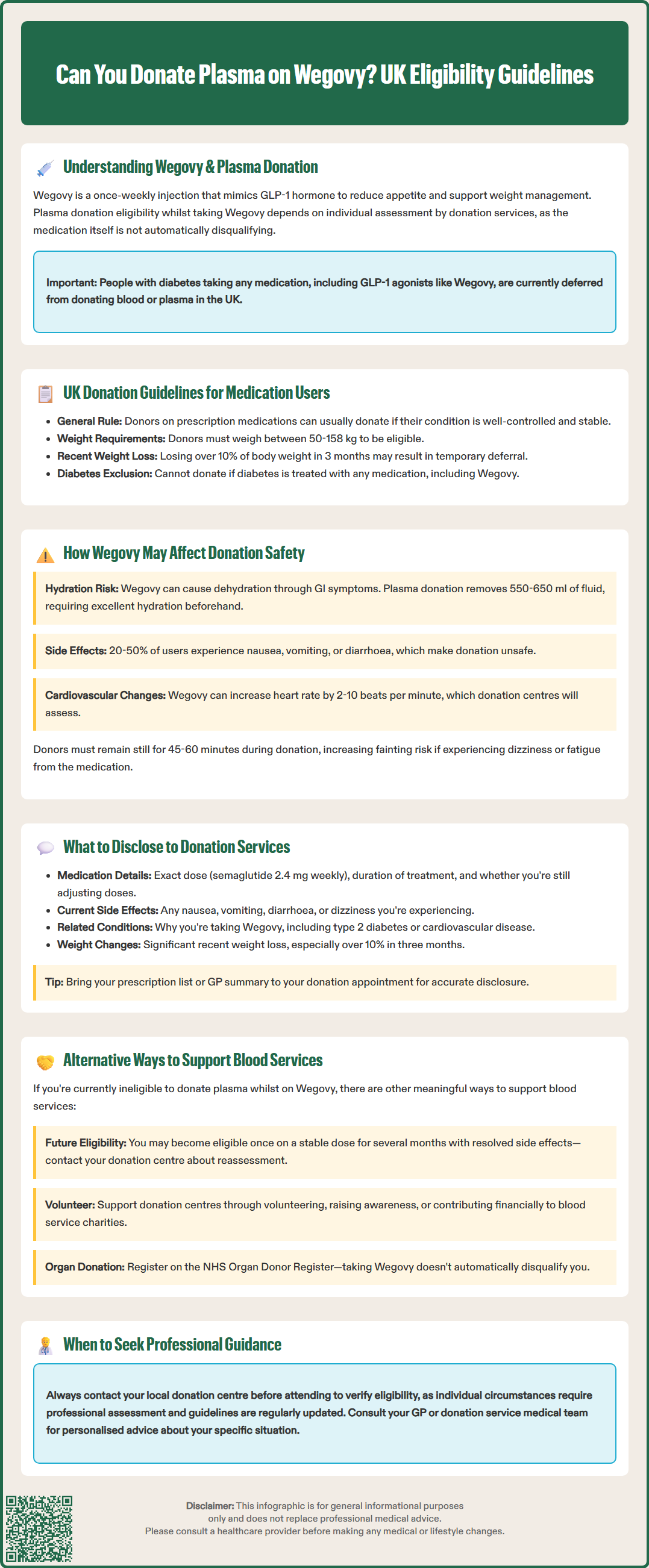
Many individuals prescribed Wegovy (semaglutide) for weight management wish to continue supporting vital plasma donation services in the UK. Wegovy, a once-weekly GLP-1 receptor agonist licensed by the MHRA for obesity treatment, does not appear on NHS Blood and Transplant's automatic medication deferral list. However, eligibility depends on several factors including underlying health conditions, medication stability, and current side effects. People with diabetes taking any medication, including GLP-1 agonists, are currently deferred from plasma donation. This article examines UK donation guidelines, safety considerations, and how Wegovy treatment may affect your ability to donate plasma.
Quick Answer: Wegovy itself does not automatically prevent plasma donation in the UK, but people with diabetes taking any medication including GLP-1 agonists are deferred, and individual assessment by donation services is required.

Mounjaro® is the most innovative GLP-1 medication proven to dramatically curb appetite, hunger, and cravings to help professional men achieve substantial weight loss.
Start Here
Wegovy® is a weekly injectable GLP-1 medication with proven effectiveness in reducing appetite, hunger, and cravings to help busy professionals lose significant weight.
Start HereWegovy (semaglutide 2.4 mg) is a glucagon-like peptide-1 (GLP-1) receptor agonist licensed in the UK for weight management in adults with obesity or overweight with weight-related comorbidities. As a once-weekly subcutaneous injection, Wegovy works by mimicking the natural hormone GLP-1, which regulates appetite and food intake through actions on the brain's satiety centres whilst also slowing gastric emptying.
Many patients prescribed Wegovy wish to continue supporting vital blood and plasma donation services. Plasma donation involves collecting the liquid component of blood, which contains essential proteins, antibodies, and clotting factors used to treat various medical conditions including immune deficiencies, burns, and trauma. Unlike whole blood donation, plasma can be donated more frequently as the body replenishes it rapidly.
The eligibility to donate plasma whilst taking Wegovy is determined by NHS Blood and Transplant (NHSBT) or other UK blood services, who assess each potential donor individually. This assessment considers the underlying health conditions that led to the prescription, medication stability, and overall donor safety. The primary concern is whether the donor is medically stable and whether the donation process might adversely affect someone taking Wegovy.
It's important to note that you should never stop taking prescribed Wegovy solely to become eligible for donation. Always consult with your GP or the blood donation service for personalised advice regarding your specific circumstances.

NHS Blood and Transplant (NHSBT) and other UK donation services (Scottish National Blood Transfusion Service, Welsh Blood Service, and Northern Ireland Blood Transfusion Service) maintain comprehensive medication guidelines to protect both donors and recipients. The general principle is that donors must be in good health, and any medication taken should not pose risks during or after donation.
For prescription medications, donation services typically assess:
The underlying condition being treated—whether it affects donor fitness
Medication stability—how long the donor has been on treatment without adverse effects
Potential side effects that might be exacerbated by donation (such as dizziness or dehydration)
Overall health status—including minimum weight (≥50 kg), haemoglobin levels, blood pressure, and venous access
Many common medications are acceptable for donation, including most antihypertensives, statins, and thyroid replacement therapy, provided the underlying condition is well-controlled. However, certain drug classes require temporary or permanent deferral, such as isotretinoin (teratogenic risk), anticoagulants (bleeding risk), or medications indicating serious underlying illness.
Regarding diabetes, it's important to note that people with insulin-treated diabetes cannot donate blood or plasma in the UK. Those with tablet or diet-controlled diabetes may be eligible if their condition is stable and without complications.
Prospective donors should always contact their local donation centre before attending, as individual circumstances require professional assessment. NHSBT provides an online eligibility checker and helpline for case-by-case assessment. Transparency about all medications and health conditions ensures safe donation practices.
Understanding Wegovy's pharmacological effects helps clarify potential donation considerations. Semaglutide has a half-life of approximately one week, meaning it remains in the system continuously with weekly dosing. Its primary actions include appetite suppression, delayed gastric emptying, and improved glycaemic control in those with insulin resistance.
Common adverse effects of Wegovy include:
Gastrointestinal symptoms—nausea, vomiting, diarrhoea, and constipation (affecting 20–50% of users, particularly during dose escalation)
Dehydration risk—secondary to gastrointestinal effects
Dizziness and fatigue—especially when combined with caloric restriction
Hypoglycaemia—primarily a risk when combined with insulin or sulfonylurea therapy; uncommon otherwise
These effects have implications for donation safety. Plasma donation removes a significant volume of fluid, which the body replaces within 24–48 hours. However, donors must be adequately hydrated beforehand and should have eaten normally. Individuals experiencing active gastrointestinal symptoms from Wegovy may be at increased risk of dehydration or electrolyte imbalance, making donation inadvisable until symptoms stabilise.
Additionally, the donation process requires donors to remain still for an extended period. Those experiencing dizziness, nausea, or fatigue from Wegovy may find this challenging and face increased risk of vasovagal reactions (fainting). Donation centres prioritise donor safety and may defer individuals with active side effects.
Cardiovascular considerations are also relevant. According to the MHRA SmPC, Wegovy can cause a small mean increase in heart rate (approximately 2–4 beats per minute) with individual variability. Whilst this is generally well-tolerated, donation services assess cardiovascular stability, and any significant tachycardia or blood pressure abnormalities would warrant deferral.
Importantly, donors should postpone donation if experiencing severe or persistent abdominal pain, acute pancreatitis symptoms, acute gallbladder disease, or ongoing vomiting or diarrhoea, and seek medical advice.
Transparency and accuracy when communicating with donation services are essential for safe plasma donation. When contacting or attending a donation centre whilst taking Wegovy, provide comprehensive information to enable proper assessment.
Key information to disclose includes:
Medication name and dose—"I take Wegovy (semaglutide) 2.4 mg once weekly by subcutaneous injection"
Duration of treatment—how long you have been taking Wegovy and whether you are still in the dose-escalation phase
Current side effects—any ongoing nausea, vomiting, diarrhoea, dizziness, or other symptoms
Reason for prescription—whether prescribed for obesity alone or with comorbidities such as type 2 diabetes, hypertension, or cardiovascular disease
Overall health status—current weight, blood pressure, and general wellbeing
Donation staff will ask about your medical history and may need to consult with medical advisors regarding Wegovy. Be prepared to discuss:
Any cardiovascular conditions (coronary artery disease, heart failure, arrhythmias)
Diabetes status—note that if you have diabetes treated with insulin, you will not be eligible to donate in the UK; if tablet-controlled, you may be eligible if stable and without complications
Recent weight changes—significant weight loss may affect eligibility temporarily
Other medications taken alongside Wegovy
Timing considerations are also important. If you have recently started Wegovy or increased your dose, you may experience more pronounced side effects. Donation services may recommend waiting until you have been on a stable dose for several weeks with minimal symptoms.
If you have previously donated plasma successfully before starting Wegovy, mention this to staff. However, each donation requires fresh assessment, as your health status may have changed. Never withhold information about medications or health conditions, and do not stop or alter your prescribed Wegovy treatment solely to become eligible for donation.
For specific eligibility questions, contact NHSBT's donor helpline or use their online eligibility checker.
If plasma donation is temporarily or permanently unsuitable whilst taking Wegovy, numerous alternative ways exist to support vital blood and transplant services in the UK.
Future donation opportunities may arise if your circumstances change. If currently deferred due to active side effects or recent treatment initiation, you may become eligible once:
You have been on a stable Wegovy dose for several months without significant adverse effects
Your weight and overall health meet donation criteria (minimum weight of 50 kg, stable blood pressure, good venous access)
Any obesity-related comorbidities are well-controlled
Maintain contact with your local donation centre and ask about reassessment timelines. Many temporary deferrals can be lifted once health status improves. Remember that you should not stop prescribed Wegovy treatment solely to become eligible for donation.
Non-donation support activities include:
Volunteering with NHS Blood and Transplant or local blood donation services—administrative support, donor reception, or refreshment services
Advocacy and awareness—encouraging eligible friends and family to donate, sharing information on social media, or organising workplace donation campaigns
Financial support—donating to blood service charities or organisations supporting transfusion-dependent patients
Participating in research—some studies seek volunteers with various health conditions to improve donation safety and eligibility criteria
Organ and tissue donation registration remains possible regardless of medication use. Whilst taking Wegovy does not automatically preclude organ donation, medical teams assess suitability at the time based on overall health. Registering your decision on the NHS Organ Donor Register ensures your wishes are known.
Finally, maintaining your own health through Wegovy treatment may ultimately improve your long-term donation eligibility. Weight loss and improved metabolic health can reduce cardiovascular risks and enhance overall fitness, potentially making you a better candidate for future donation once treatment stabilises.
If you experience any suspected side effects from Wegovy, report them via the MHRA Yellow Card Scheme.
Wegovy itself is not on NHS Blood and Transplant's automatic deferral list, but people with diabetes taking any medication including GLP-1 agonists are deferred. Individual assessment by donation services is required based on your underlying conditions and overall health.
Disclose your medication name and dose, duration of treatment, any current side effects, reason for prescription, recent weight changes, and all comorbidities. Bring your repeat prescription list or GP summary letter to your appointment.
Active side effects such as nausea, vomiting, diarrhoea, dehydration, or dizziness may make donation inadvisable until symptoms stabilise. Donation centres prioritise donor safety and may defer individuals with ongoing adverse effects.
All medical content on this blog is created based on reputable, evidence-based sources and reviewed regularly for accuracy and relevance. While we strive to keep content up to date with the latest research and clinical guidelines, it is intended for general informational purposes only.
DisclaimerThis content is not a substitute for professional medical advice, diagnosis, or treatment. Always consult a qualified healthcare professional with any medical questions or concerns. Use of the information is at your own risk, and we are not responsible for any consequences resulting from its use.